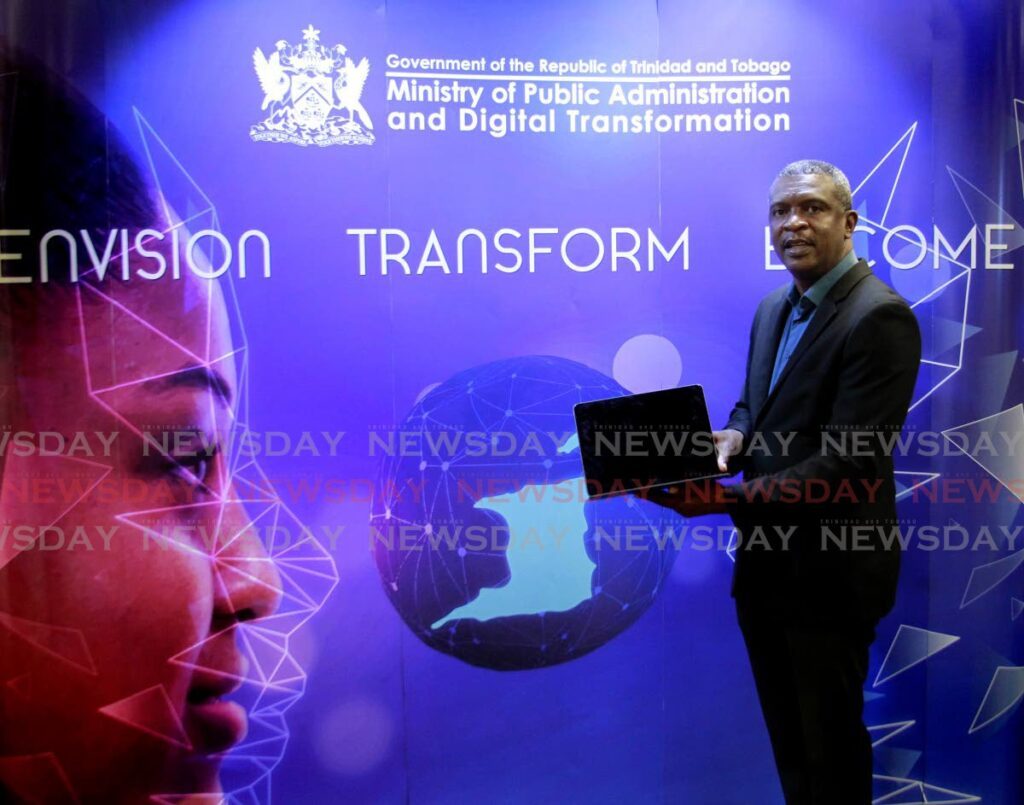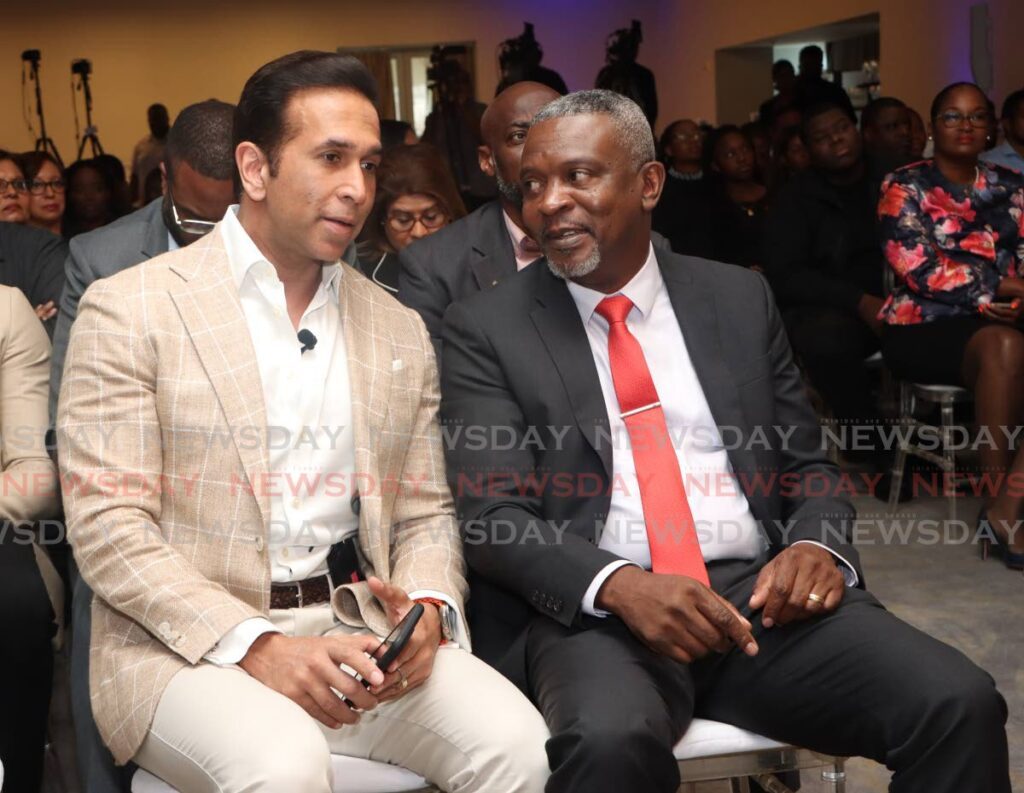Ministry of Digital Transformation in 'full mode'

THE PUBLIC and private sectors are seeing the fruit of the Ministry of Digital Transformation’s “breakthrough” as it marks its third year of existence on July 12.
And the ministry and the national digital transformation agenda are in "full implementation mode," the minister, Hassel Bacchus, boasted on July 1, during his feature presentation at the American Chamber of Commerce of TT’s (AmchamTT) Tech Hub islands Summit at Hyatt Regency, Port of Spain.
Guided by the government’s notion of “inclusion by design,” he said the public and private sectors and academia have all contributed to a growing ecosystem of tech and tech development professionals in TT.
“Collaboration and partnership are closely related to another of our fundamental principles of digital transformation,” Bacchus said.
“The notion of inclusion-by-design – our commitment that everyone in TT has access to appropriate and affordable digital technology, and has the capability and confidence to use the technology safely and effectively.”
The Digital Transformation Ministry has worked in tandem with the other ministries on several projects, including recently released mobile apps, including the Developers’ Hub (D’Hub).
“The principle of partnership is embedded in the approach adopted by the international community for ICT (information and communications technology) development from the start,” Bacchus said.
“When the UN convened the first phase of the World Summit on the Information Society (WSIS)back in 2003, the entire WSIS process was based on building an equal partnership among government, the private sector, and civil society.
“This was also the approach adopted by us in TT, when developing Fast-Forward, our first national ICT Strategy."
He said the progress of D’Hub has been “extremely encouraging”: it surpassed 1,000 members in May.
D’Hub is designed to expand the range, utility and quality of the existing and new e-services provided to citizens and businesses. Bacchus said it was developed in a partnership between the government, the Inter-American Development Bank, the private sector, and academia.
D’Hub was launched in July 2022, as a “virtual ecosystem” designed to enable, host and support the open source/open standard mobile and web apps “of specific interest to the government, using government data,” Bacchus explained.
“We’re well on our way to having a local developers group build applications for use in the public sector (although) the private sector has been knocking on our doors to get things built and solved for them as well,” he said.
He lauded challengers of the recently concluded Developers Hub Challenge television series, saying the innovations demonstrated by the participating teams were a testament to local capabilities.
“The long-term vision for this ecosystem is the actualisation of the ministry’s motto – ‘made by TT for TT and the world.'”
The Developers’ Hub won the Inter-American Development Bank’s Innovation in the Public Sector award in December, 2023, and was named WSIS winner in May.
Bacchus announced the ministry is working towards creating this country’s first national software-development export company to harness “the raw talent that resides within, and demonstrating once again that TT can compete (internationally).”

He said the current generation of local entrepreneurs is unlike any other.
“Empowered by digital technologies and unencumbered by legacy structures, they are unleashing fundamentally new business practices at a pace that was almost unthinkable just a couple of decades ago…inventing new business models and monetisation strategies all along the way."
Bacchus also praised WeLearnTT, a digital education platform that curates specialised ICT course content from international education providers.
It facilitates customised knowledge offerings delivered face-to-face or remotely through the ministry’s ICT access centres.
WeLearnTT is designed to raise TT’s “digital IQ,” he said.
“The goal of digital education is to create learning experiences that are engaging, personalised, and accessible to all.
“The span of its reach covers from the novice to the ICT space to the seasoned practitioner who aims to catalyse the development of their MSE businesses.”
Cyber security, digital transformation balance
Bacchus addressed the government’s investment in cyber security, saying it was critical to keep a step ahead.
Digital transformation, he said, denotes the strategic adoption of new digital tools and technologies to improve productivity, customer satisfaction and employee satisfaction.
The downside is: “This brings with it significant threats to the ICT landscape, as the incidence of threat actors increases exponentially each year.
“Cyber security is not only about law, enforcement and security solutions and systems; it is also – and I believe this is equally important – about building cyber security awareness and a culture of cybersecurity in our national community.
“The pursuit of national awareness of cyber security must be a collective effort, and it is crucial that we engage in comprehensive outreach to educate and inform the public about the importance of cyber security.”
Bacchus said the ministry is committed to incorporating cyber security “by design” in all its initiatives. The ministry’s work comprises several discrete elements, he said, including cyber security policy, upgrades to the TT Cyber Security Incident Response Team, improvement of public-sector cyber resiliency, and the protection of critical national infrastructure.
Bacchus encouraged private companies to take advantage of the government’s cyber security investment tax allowance (CITA). The allowance can be accessed via the iGovTT CITA mobile app, launched on June 12.
He described the tax allowance as a good example of a new generation of e-services, becoming increasingly available through ministry departments and government agencies.
Several other mobile apps were recently launched, offering public-sector services.
The Ministry of Rural Development and Local Government also launched its LocalTT mobile app on June 12, allowing users to report issues concerning roads, public health and safety and emergency incidents.
The DevelopTT Portal, a joint initiative of the Ministry of Planning and Development and the Ministry of Rural Development, was also recently launched. The app replaces traditional paper-based and in-person application and approval systems associated with property development, with an online process.
Bacchus said the system is being expanded to include the public utilities, while the TTBizLink business facilitation services are also being improved.
“As we approach our third anniversary, we are ramping up to full implementation mode and this will lead to each…bearing fruit.”
Bacchus promised to release the ministry's exhaustive list of initiatives and accomplishments in the coming weeks.
About the Tech Hub Islands Summit
Bacchus lauded AmCham TT, one of the ministry’s key partners, for staging another summit, first held in 2018.
Some 25 industry experts shared presentations and held panel discussions on tech integration, development, cyber security and related topics on June 1 and 2.
“AmCham and its network represent the potential for strengthened networks and opportunities for these young people,” said Bacchus.
AmCham chief executive Nirad Tewarie stressed that the purpose of technology, especially in the workplace, is to improve conditions for businesses and workers.
“We’re all worried to some extent about the impact of technology on work as it is today.
“Instead of seeing that as a concern, though, we have to think of the thousands of people who are employed in things that may not be fulfilling work.
“I don’t want to single anything out, but to say, can we use technology to transition to higher-value, more meaningful work?”
AmCham’s answer is “Yes,” he said, “Yes, we can do that. And so we say, connect that to a value that we have as a country.”
Therefore, he said, no one working 40 hours a week should struggle to make ends meet.
“They should not be stuck in the poverty trap.” Tewarie said. “Intergenerational poverty should not be a thing."
AmCham said the Tech Hub Islands Summit is one of the ways it works toward advancing digital-transformation efforts and initiatives to make TT a major player in the global tech ecosystem.

Comments
"Ministry of Digital Transformation in ‘full mode’"